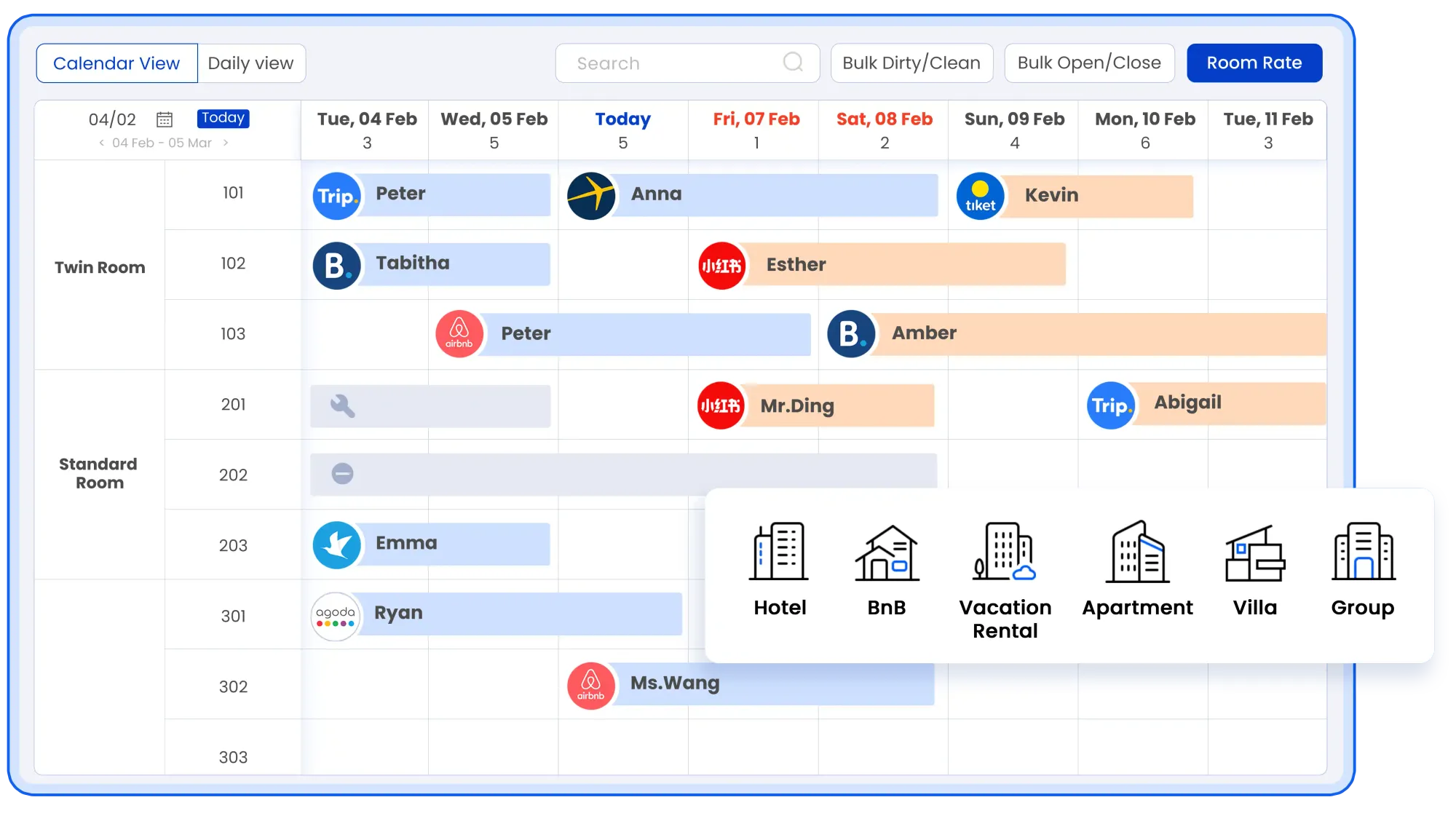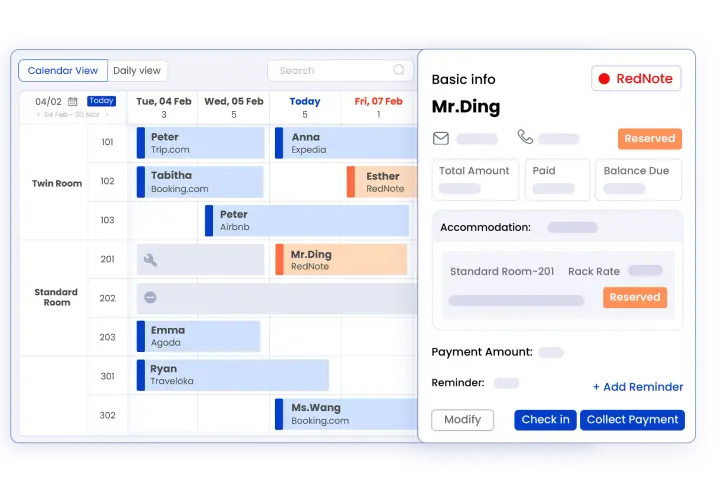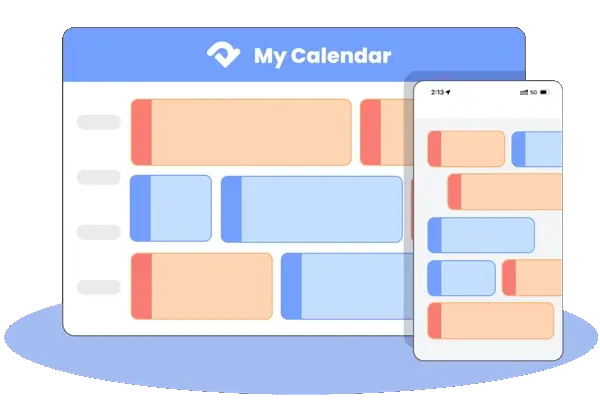Running a hotel—whether it’s a small B&B or a big resort—means you’re always handling tons of small things. Checking guests in, keeping room info up to date, taking payments, even remembering that Mr. Wang always wants a quiet room on the top floor… the list goes on and on. And if you’re still using spreadsheets, sticky notes, or just pen and paper to handle bookings? You’ve probably dealt with the stress of double-bookings, missed payments, or guests showing up to find their room isn’t ready.
That’s where a hotel reservation management system comes in. It’s not just another program. It’s what makes everything run smoothly, keeps guests happy, and helps your business do better. Let’s look at what it is, how it works, and why it could be the best tool you get for your hotel this year.
What Is a Hotel Reservation Management System?
Let’s start simple. A hotel reservation management system is a tool that handles the whole booking process—from when a guest clicks “book” until they check out (and even after). Think of it as one central place that keeps track of rooms, prices, guest details, payments, and everything else.
You might hear it called a “hotel reservation system” or “booking system”—they all mean the same thing. Their main job is to make sure bookings go smoothly. But here’s what makes it different: Unlike a basic booking engine (which just lets people book on your website) or a channel manager (which syncs room availability across sites like Booking.com), a hotel reservation management system does all of it. It ties everything together so you’re not switching between ten different apps to get work done.
For example: If someone books through your website, the system automatically updates your room count so that the same room doesn’t get double-booked on Booking.com. It saves their contact info, notes if they asked for a king bed, and sends a confirmation email—all on its own. You don’t have to do a thing. That’s it.

Key Features of a Hotel Reservation Management System
Not all hotel reservation management system tools are created equal, but the best ones share a set of features that make life easier for hotel teams. Here’s what to look for, based on years of working in the industry:
- Real-time room inventory tracking: This is non-negotiable. The system should show exactly how many rooms are available, which are booked, and which are being prepped for check-in—instantly. No more “let me check the spreadsheet” delays. If a room gets booked, every channel (your website, OTAs, even your front desk) updates right away. Say goodbye to overbookings.
- Multi-channel booking sync: Most guests book through more than one place—your website, Airbnb, Expedia, or even a phone call. A good hotel reservation management system connects all these channels, so a booking from any source updates your inventory everywhere. Some small hotels waste hours manually updating OTA calendars; this feature alone can save a full workday each week.
- Guest profile management: Remembering little details makes guests feel valued. A hotel reservation management system stores info like birthdays, room preferences (e.g., “no feathers in pillows”), or past stays.
- Automated communication: Guests hate waiting for confirmations. A solid system sends instant emails or texts when a booking is made, with all the details: check-in time, parking info, even a note about your free breakfast. It can also send reminders a day before arrival, so they don’t forget their reservation.
- Payment processing: Collecting deposits, processing full payments, or handling refunds should be seamless. The best systems integrate with credit card processors and even let guests pay online when they book, reducing the risk of no-shows.
- Reporting and analytics: Ever wondered which OTA brings in the most bookings? Or which room type is most popular in summer? A hotel reservation management system crunches the numbers for you. You’ll get reports on occupancy rates, revenue per available room (RevPAR), and booking sources—so you can make smarter decisions, like raising rates for your top-selling rooms in peak season.
- Mobile access: Hotel life isn’t tied to a desk. A system with a mobile app lets you check bookings, update rates, or answer guest questions from anywhere—whether you’re in the lobby, the kitchen, or even on a quick break.
How Does a Hotel Reservation Management System Work?
The whole process runs smoothly, linking guests and staff without any hiccups.
- It starts when someone looks for a hotel online and finds yours. They book a room right on your website or other third-party platforms. The second they hit “confirm,” your booking system kicks in. It locks in their room and sends an automatic confirmation email right away. At the same time, the channel manager tells all other booking sites that this room is now taken. All this happens super fast.
- Behind the scenes, the system makes a new guest file. It saves their booking info and contact details. Your front desk team sees the new reservation pop up on their screen, with everything they need for the guest’s arrival. Nobody has to type in details by hand or worry about booking the same room twice. When the guest shows up, the front desk just uses the hotel system to find the booking and check them in quickly. Everything is neat and easy to find.
- After the guest leaves, the system marks the room as dirty so housekeeping knows to clean it. It can also send a follow-up email automatically, asking how their stay was. The whole thing works on its own, flows nicely, and keeps things easy for both your team and your guests. That’s what a good booking system does for you.
Who Needs a Hotel Reservation Management System?
You might think, “This is only for big hotels with 100+ rooms.” But that’s not true. Any accommodation that takes bookings can benefit—whether you run a 5-room B&B, a boutique hotel, a chain of resorts, or even a vacation rental.
- Small B&Bs or guesthouses: If you’re handling bookings via email or phone, you’re probably spending hours updating calendars and chasing payments. A hotel reservation management system cuts that time in half, so you can focus on baking that amazing homemade bread your guests love.
- Mid-size hotels: With more rooms and more booking channels, the risk of double-bookings skyrockets. A system keeps everything in sync, so your front desk isn’t left apologizing to a family that traveled 3 hours for a room that’s “suddenly unavailable.”
- Chain hotels or resorts: Managing multiple properties? A hotel reservation management system lets you oversee all of them from one dashboard. You can check occupancy at your beach location and your city property in 30 seconds, or adjust rates across all locations for a holiday weekend.
- Vacation rentals: Even if you rent out a single apartment, a system helps you avoid the “I thought I blocked that week for my family” mistake. It syncs with Airbnb, Vrbo, and your own website, so you never miss a booking or double-book.
In short, if you’ve ever thought, “There has to be a better way to manage bookings,” you need a hotel reservation management system.
How to Choose the Right Hotel Reservation Management System?
Selecting the best solution depends on your property size, budget, and goals. Here are a few points to consider:
- Ease of Use – The system should have an intuitive interface and require minimal training.
- Integration Capabilities – Make sure it integrates with your PMS, channel manager, and payment gateways.
- Cost and ROI – Compare pricing plans and look for features that deliver the most value for your investment.
- Security and Compliance – Ensure the system follows global security standards for guest data and payments.
- Customer Support – Choose a provider with 24/7 support and a good reputation for reliability.
A trial period or demo can help you test the system before making a final decision.
Conclusion
Honestly, a hotel reservation management system isn’t just tech—it’s about making your work easier and your guests happier. I’ve seen hotels go from messy paperwork and constant mistakes to running smoothly, all because they started using the right system.
Call it whatever you want. The point is the same: it takes the headache out of bookings. That way, your team can focus on what really matters—making sure guests have a great stay.
If you’re still using spreadsheets or juggling too many tabs, it’s time to make the switch. Your staff, your guests, and even your bank account will be better for it.

